
Drought, floods and tough economic conditions affecting the region have significant knock-on effects to rural communities, new Rural Women New Zealand boss Marie Fitzpatrick says.
Fitzpatrick, of Wellington is mere weeks into the chief executive officer role.
She was in Ashburton last week as a guest of the organisation’s region 2 conference at the Ashburton Event Centre.
Fifty members were registered, among them life members and past national presidents, region chair Margaret Chapman, and Jeanette Tarbotton, both of Mid Canterbury, as well as national board members Sharron Davie-Martin and Annette Marr and Heather Sorensen, and guest New Zealand Federation of Women’s Institutes president Jude Vaughan, of Staveley.
Fitzpatrick, formerly at Ministry for Primary Industries (MPI) and co-founder of Good Bitches Baking, was at the conference to meet members and hear about issues faced by members in the region. It was her first visit to the regions in the role.
‘‘I’m primarily here because I’m brand new and to understand the members and their needs, but also to understand the rural issues that matter in this part of New Zealand,’’ she said.
The organisation has around 1600 members nationwide and region 2 has one of the biggest memberships.
‘‘Drought is a big problem here and, certainly from my exposure at MPI, I got an understanding over the years of the challenge that presents here – and also the floods when they perversely do the opposite.
‘‘The economic conditions cumulatively are pinching even harder, cause if you’ve got drought you’re feeding out early, you’re having to buy your feed and we’ve all got theses macro economic situations that’s making it it hard for everybody.
‘‘So I can appreciate it will probably have a significant knock-on effect into mental health, health in general, how you respond to crisis in your life, all those types of things.’’

Fitzpatrick was with MPI on the leadership team at Fisheries New Zealand where the coastal fishing communities faced similar issues as the rural communities. Among her many jobs was the rolling out cameras on commercial fishing boats.
‘‘I really enjoyed getting to know that sector and understood their plight, in a way that perhaps I hadn’t before.’’
Four weeks into her new role at Rural Women, Fitzpatrick was bursting with enthusiasm and keen to hear from members at the coalface.
‘‘I really like being at the frontline of helping communities adapt to either new regulation, or adverse events or whatever it is,’’ she said.
‘‘As a long term policy-driven person from Wellington, we don’t always get it right setting the policy settings and understanding the human impact of those policy settings.
‘‘So I wanted to have a go at being on the other side and badgering them to do a better job at the top so things can work better for communities.’’
Fitzpatrick grew up in rural Middlemarch and Dunedin before a family move to Australia.
She returned to New Zealand as an adult with an Australian husband in tow, in the early 2000s.
‘‘I am originally rural …. I became a city girl living in Sydney for my high school years and university.
‘‘I’m thoroughly a city slicker but I always love getting back to my rural roots,’’ she said, of regular holidays to Otago.
She said Rural Women had five action areas they wanted government to focus to improve the health and wellbeing of rural families; health and wellbeing, community and social inclusion, education, rural connectivity and business, and environment and land use.
‘‘Community and social inclusion are really important ones and that’s what the people at (this) conference are really at the frontline of,’’ she said.
‘‘I believe the rural sector and rural communities are fundamental to New Zealand’s success as a country and also to its culture, and I’m excited to be a part of it,’’ she said.



